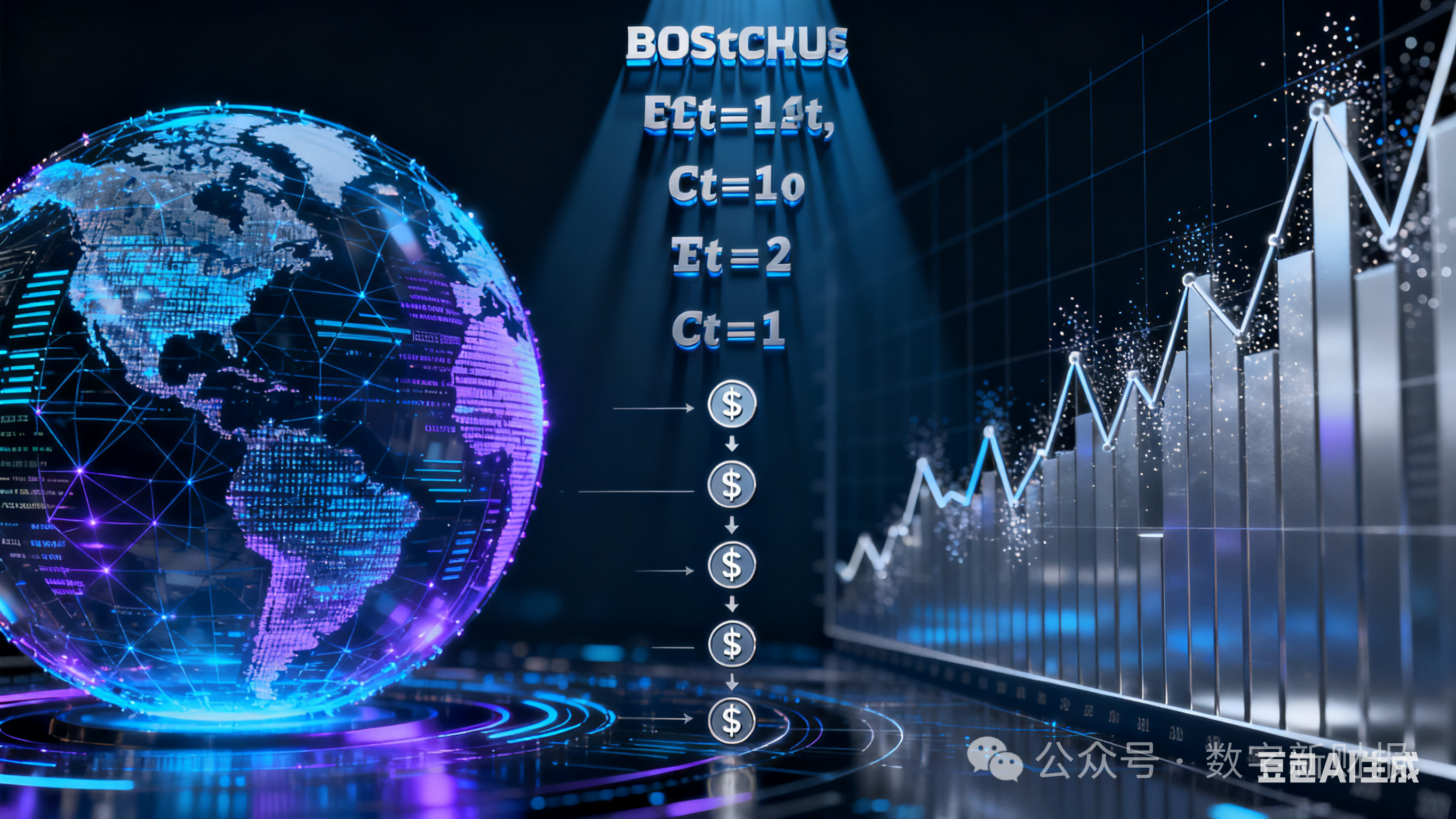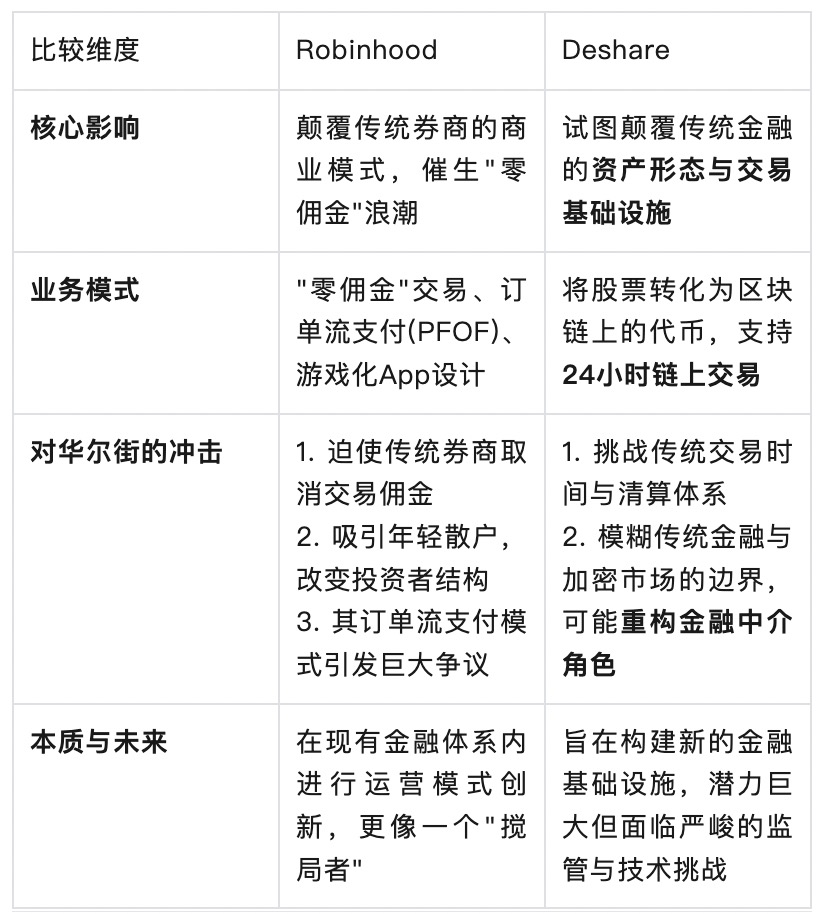Author: Zhang Feng
The Deshare platform has announced the launch of the first fully-stock token on-chain trading platform on the Arbitrum network, utilizing a "real-time on-chain trading + off-chain dynamic reserve" hybrid mechanism, achieving real-time decentralized trading support for thousands of U.S. and Hong Kong stocks.
This innovative attempt aims to bring traditional stock trading into the blockchain world, allowing global users to trade stock assets 24/7 without interruption and with zero barriers. Thousands of U.S. and Hong Kong stocks can be traded on the blockchain 24/7, with zero barriers and complete self-custody. Deshare is breaking down the barriers of traditional finance with its hybrid mechanism.

1. The Dual Dilemma of Traditional Finance and the Crypto World
The current investment world is facing unprecedented division: traditional stock markets are limited by trading hours, geographical boundaries, and high barriers, while the crypto market is trapped in skepticism over high volatility and limited practicality.
The pain point of trading barriers in traditional stock markets is paramount. Traditional stock markets are only open at specific times, preventing investors from reacting to sudden news outside of trading hours, and cross-border investments face complex account opening processes, foreign exchange controls, and high fees. The issue of asset custody is also prominent. In traditional brokerage firms, investors do not directly hold stocks but rather hold them indirectly through a series of intermediaries.
In the crypto world, decentralized exchanges (DEX) face the challenge of fragmented liquidity. A report from the XBIT Research Institute shows that large transactions (over $100,000) on mainstream DEX platforms have an average slippage of 3.2%, which is 5-8 times higher than centralized exchanges (CEX). Compliance uncertainty is another pain point in the crypto world, with over 62% of DeFi platforms facing risks of non-compliance with KYC standards by 2025.
2. Innovative Business Model of On-chain and Off-chain Hybrid Mechanism
Deshare's core innovation lies in its "real-time on-chain trading + off-chain dynamic reserve" hybrid mechanism. This design attempts to find a balance between decentralization and practicality.
On-chain trading ensures transparency and security. User funds are fully self-custodied on-chain, avoiding the risk of fund misappropriation that may occur with traditional brokers, and eliminating withdrawal restrictions that may arise with CEX. Off-chain dynamic reserves address the issue of trading depth. By collaborating with traditional market makers, sufficient asset reserves are established off-chain to ensure that users can transact at market prices at any time, avoiding high slippage issues.
This model is different from the perpetual DEX that surpassed $1 trillion in trading volume in September 2025, and it is also different from the newly launched hybrid index by S&P, which merely combines 15 cryptocurrencies with 35 crypto-related stocks.
3. Multi-dimensional Value Capture Profit Model
Although Deshare has not explicitly disclosed its specific profit model, several potential revenue sources can be inferred from its business design.
Transaction fees are the most straightforward source of revenue. Although the platform may implement low or even zero fee strategies for early promotion, charging a small transaction fee in the long run is the foundation for sustainable operation.
Premium service fees are another possible direction. This includes leveraged trading (the platform has announced plans to launch contract trading services with up to 50x leverage in the future), API access, institutional-level data services, etc.
Liquidity provision revenue should not be overlooked. The platform can generate revenue from the bid-ask spread through proprietary market making or revenue sharing with professional market makers.
4. Redefining the Stock Trading Experience
The emergence of Deshare signifies a potential comprehensive upgrade in the stock trading experience, characterized mainly by three aspects:
Full support is its primary breakthrough. Unlike previous attempts that only supported a few popular stocks for tokenization, Deshare has achieved comprehensive support for thousands of U.S. and Hong Kong stocks, truly breaking the boundary between traditional assets and crypto assets.
Seamless experience is another major feature. Users do not have to face the complex account opening processes of traditional brokers or deal with the cumbersome procedures of cross-border investments; they can directly trade various stock tokens through an on-chain wallet, enjoying uninterrupted trading services 24/7.
Composability opens the door to innovation. Since all stock tokens are issued on-chain, they can seamlessly integrate into the entire DeFi ecosystem, allowing users to use stock tokens as collateral for lending, provide liquidity for additional returns, or combine them with other crypto assets to form investment portfolios.
5. Deeply Impacting Wall Street from Different Paths than Robinhood
The stock tokenization platform represented by Deshare may reshape the traditional stock market from multiple dimensions:
Extending trading hours will be the first priority. The limited trading hours of traditional exchanges have long troubled global investors, while on-chain stock trading can achieve true uninterrupted trading, allowing investors to respond promptly to news events released outside of trading hours.
Lowering investment barriers also has far-reaching implications. Investors worldwide, especially those from regions with underdeveloped financial infrastructure, can invest in quality assets like U.S. and Hong Kong stocks through platforms like Deshare, greatly enhancing the efficiency of global capital flow.
The possibility of changing market structure cannot be ignored. As more stocks circulate in token form on-chain, the role of traditional intermediaries will gradually diminish, and the roles of exchanges, brokers, clearinghouses, and other traditional financial intermediaries will face redefinition.
Robinhood and Deshare have profoundly impacted Wall Street from different paths.

In summary, Robinhood is more like a disruptor within the traditional rules of the game on Wall Street, changing the business model of brokers and the investment behavior of retail investors. In contrast, the model represented by Deshare attempts to reshape the existence and circulation of financial assets themselves through blockchain technology, with potentially more profound and thorough impacts.
6. Injecting Real-World Assets into the Crypto Market
The development of stock tokenization platforms holds strategic significance for the crypto market as well:
Introducing traditional capital. Stock tokenization platforms provide a more familiar pathway for traditional investors to enter the crypto world. Investors can start with stock assets they are familiar with and gradually explore other crypto-native assets, significantly reducing learning costs and psychological barriers.
Enhancing the utility of stablecoins. On-chain stock trading is likely to primarily use stablecoins as the pricing and settlement tool, which will greatly enhance the use cases and circulation scale of stablecoins, further solidifying their position as financial infrastructure in the crypto ecosystem.
Enriching the DeFi ecosystem. The introduction of real-world assets opens new markets for DeFi protocols; stock tokens can be used as collateral in lending protocols, can be traded in index funds in AMMs, or can be combined with other crypto assets to form structured products.
7. Navigating the Gray Area of Compliance and Risk
The most severe challenge faced by stock tokenization platforms is undoubtedly compliance and regulatory risk.
Securities law compliance is the primary issue. The U.S. SEC has long maintained that most tokens fall under the category of securities and should be regulated by securities laws. Stock tokens, which directly correspond to traditional stocks, are highly likely to be classified as securities, facing strict disclosure requirements and regulatory obligations.
It is worth noting that SEC regulatory policies are changing. In the second quarter of 2025, the new SEC Chairman Paul Atkins proposed a positive regulatory exploration path regarding DeFi during a congressional hearing, including establishing an "innovation exemption mechanism" for protocols with a high degree of decentralization.
KYC/AML compliance is also critical. In 2025, over 62% of DeFi platforms face risks of non-compliance with KYC standards in the major compliance risks of the cryptocurrency market. For Deshare to develop in the long term, it must establish strong KYC/AML policies to verify user identities and monitor suspicious transactions.
Cross-border legal risks cannot be ignored either. Different countries have varying regulations regarding securities trading, financial advertising, and investor suitability, and a global platform inevitably faces conflicts and challenges regarding legal jurisdiction.
8. Opportunities and Challenges Coexist
Looking ahead, the development path of stock tokenization platforms like Deshare may face various possibilities. The real test for Deshare is how to find a balance between innovation and compliance, decentralization and user experience.
Regulatory adaptation will be the first hurdle. The platform may adopt a compromise solution of "compliance front-end + decentralized back-end"—the front-end interface executes KYC and regional restrictions, while the back-end protocol remains open and decentralized.
Technical optimization is also crucial. With the development of Layer 2 technology and zero-knowledge proofs, trading speed and costs are expected to be further optimized.
Ecosystem expansion is a natural evolutionary path. Starting from pure stock trading, the platform is likely to gradually expand to more asset classes, such as bonds, funds, derivatives, etc., ultimately becoming a comprehensive on-chain financial supermarket.
The traditional financial industry is witnessing the quiet infiltration of blockchain technology. Recently, for example, S&P launched a hybrid index that combines 15 cryptocurrencies with 35 crypto-related stocks; the monthly trading volume of decentralized perpetual contract exchanges has surpassed $1 trillion—transformation is at hand.
What Deshare represents is not only product innovation but also a philosophy: the global financial market should be seamlessly connected, asset flow should be free, and the underlying financial services should be open and transparent. Perhaps in the near future, investors will no longer need to distinguish between traditional stock markets and crypto markets, but will freely allocate global assets in a unified on-chain financial market.
免责声明:本文章仅代表作者个人观点,不代表本平台的立场和观点。本文章仅供信息分享,不构成对任何人的任何投资建议。用户与作者之间的任何争议,与本平台无关。如网页中刊载的文章或图片涉及侵权,请提供相关的权利证明和身份证明发送邮件到support@aicoin.com,本平台相关工作人员将会进行核查。



